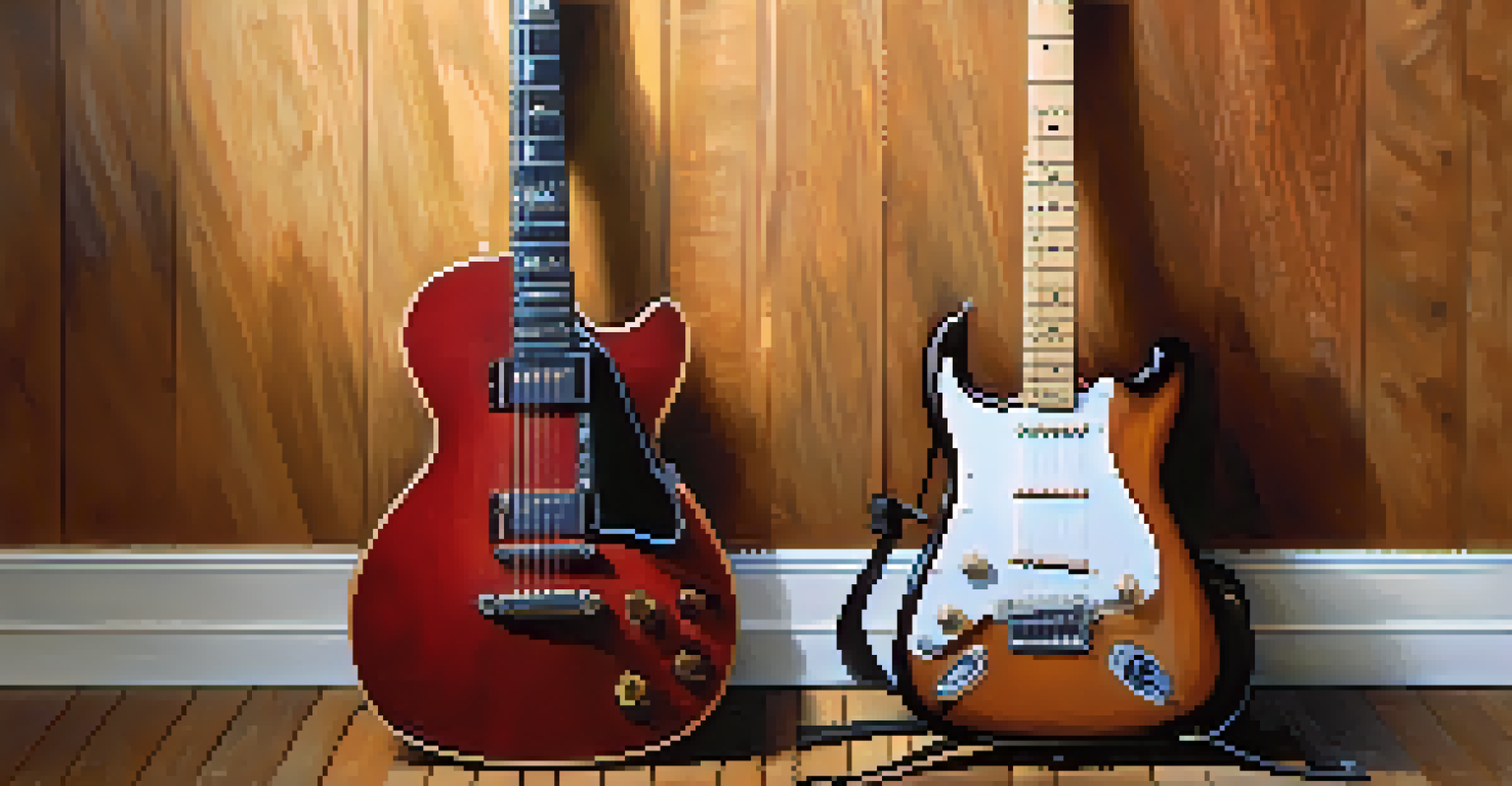Electric vs Acoustic: Which Guitar is Better? Myths Explained

Understanding Electric and Acoustic Guitars
Electric and acoustic guitars are two popular choices for musicians, each with its unique characteristics. An acoustic guitar produces sound naturally through its hollow body, while an electric guitar relies on electronic amplification. This fundamental difference impacts everything from sound quality to playing style, making it crucial to understand both types before making a choice.
Music can change the world because it can change people.
For instance, acoustic guitars are often favored for folk, country, and unplugged genres due to their warm, rich sound. On the other hand, electric guitars shine in rock, blues, and jazz, offering versatility through effects and amplification. By grasping these distinctions, players can better navigate their musical journey.
Ultimately, the choice between electric and acoustic can shape your musical expression. So, whether you’re strumming a classic ballad or shredding a guitar solo, knowing what each type brings to the table is essential for any aspiring guitarist.
Myth 1: Acoustic Guitars Are Only for Beginners
A common misconception is that acoustic guitars are only suitable for novice players. While they are incredibly accessible for beginners, many professional musicians favor them for their expressive sound and simplicity. Renowned artists like Ed Sheeran and Taylor Swift showcase the depth that acoustic guitars can offer, debunking this myth.

Moreover, acoustic guitars allow for a more organic connection to the music, as they require no additional equipment. This simplicity can lead to more focus on songwriting and composition, which is crucial for any serious musician. So, whether you're starting out or have years under your belt, acoustic guitars can be a powerful tool for creativity.
Acoustic Guitars Are for Everyone
Acoustic guitars are not just for beginners; they are versatile instruments valued by musicians at all levels for their expressive sound.
In reality, acoustic guitars hold their ground in all levels of expertise, making them versatile instruments in the music world. They can serve as both a practice tool and a professional instrument, proving that they aren't just for beginners.
Myth 2: Electric Guitars Are Easier to Play
Many believe that electric guitars are easier to play due to their lighter strings and lower action. While it’s true that the setup can make certain techniques more accessible, mastering the electric guitar involves a different set of challenges. The intricacies of effects pedals, amplifiers, and sound manipulation can be quite daunting for beginners.
The beautiful thing about learning is that no one can take it away from you.
Additionally, the techniques used in electric guitar playing, like bending notes and using vibrato, require a different kind of skill. This doesn’t mean one is inherently easier than the other; it simply means that each has its own hurdles. Players must invest time to become proficient, regardless of the type they choose.
In essence, it’s not about which guitar is easier but rather which one aligns best with your musical goals. Each instrument has its unique challenges, making it essential to approach both with dedication and practice.
Myth 3: Acoustic Guitars Cannot Be Used for Rock
Another myth floating around is that acoustic guitars can’t hold their own in rock music. This notion is far from reality, as many rock artists have incorporated acoustic guitars into their songs, proving their versatility. Iconic bands like Nirvana and Oasis have crafted unforgettable hits featuring acoustic elements that resonate with listeners.
The acoustic guitar can provide a refreshing contrast to the electric sound, adding depth and texture to rock compositions. Think of the acoustic intro to 'Wonderwall'—it's not just a filler; it creates an emotional connection with the song. This illustrates how acoustic guitars can effectively drive a rock narrative.
Electric Guitars Have Unique Challenges
Mastering an electric guitar comes with its own set of complexities, making it equally demanding as playing an acoustic.
So, don’t shy away from using an acoustic guitar in rock; embrace its unique qualities. It can enhance your sound and provide a different vibe that electric guitars alone may not achieve.
Myth 4: Electric Guitars Are More Versatile
It's often claimed that electric guitars are inherently more versatile than acoustic ones. While electric guitars do offer a wide range of tones through effects and amps, acoustic guitars have their own unique versatility. They can easily transition between genres like folk, blues, country, and even rock, showcasing their adaptability.
For example, an acoustic guitar can deliver both gentle fingerpicking and powerful strumming, making it suitable for various musical styles. Additionally, they can be played solo or accompany a group, which adds to their flexibility. This adaptability challenges the notion that electric guitars reign supreme in versatility.
In the end, versatility is subjective and depends on how you want to use your guitar. Both types can serve various musical purposes, and your creativity can determine how versatile your instrument can be.
Myth 5: You Need Both to Be a Good Guitarist
Some may argue that to be a well-rounded guitarist, one must master both electric and acoustic guitars. While having both can be beneficial, it's not a prerequisite for becoming a skilled musician. Many artists excel by focusing on one type, refining their technique and style without the pressure of juggling multiple instruments.
Consider musicians like Johnny Cash, who predominantly played acoustic guitar yet left a massive impact on music. By honing in on one instrument, players can develop a deeper connection and understanding of their chosen guitar style. This depth can lead to more authentic musical expression.
Choose Based on Personal Preference
Selecting the right guitar depends on your musical style and where you plan to play, highlighting the importance of personal preference.
Ultimately, choosing to specialize in either electric or acoustic guitar can foster your growth as a guitarist. It's about quality over quantity—dedication to one type can yield remarkable results.
Choosing the Right Guitar for Your Style
When it comes to selecting between electric and acoustic guitars, personal preference plays a significant role. Consider the music you love to play; if you're drawn to strumming cozy folk tunes, an acoustic guitar might be your best bet. Alternatively, if you’re itching to rock out with distortion and solos, an electric guitar could be calling your name.
Beyond personal taste, think about where you plan to play. Acoustic guitars are generally easier to transport and require no additional gear, making them perfect for campfires or small gatherings. Electric guitars, however, may necessitate more equipment, including amplifiers and pedals, which can influence your decision.

Ultimately, the right guitar for you is one that excites you and aligns with your musical aspirations. Whether you choose electric, acoustic, or both, the goal is to enjoy the journey of making music.
Final Thoughts: Embrace Your Guitar Journey
At the end of the day, the debate between electric and acoustic guitars is less about which is better and more about what resonates with you. Each type has its strengths, challenges, and unique flavors to offer, contributing to the rich tapestry of music. Embracing your personal journey with either instrument can lead to incredible musical experiences.
Remember, myths can be misleading, and it's essential to carve your own path based on your preferences and goals. Whether you strum an acoustic ballad or shred an electric solo, what truly matters is your passion for music and your willingness to explore.
So, pick up that guitar, experiment, and let your musical voice shine. Regardless of the type you choose, your journey is what makes you a guitarist, and that’s something to celebrate.